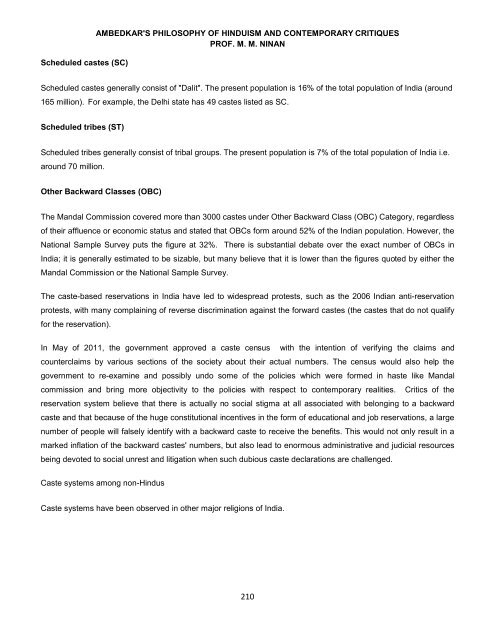Ambedkar-Philosophy of Hinduism
Create successful ePaper yourself
Turn your PDF publications into a flip-book with our unique Google optimized e-Paper software.
Scheduled castes (SC)<br />
AMBEDKAR'S PHILOSOPHY OF HINDUISM AND CONTEMPORARY CRITIQUES<br />
PROF. M. M. NINAN<br />
Scheduled castes generally consist <strong>of</strong> "Dalit". The present population is 16% <strong>of</strong> the total population <strong>of</strong> India (around<br />
165 million). For example, the Delhi state has 49 castes listed as SC.<br />
Scheduled tribes (ST)<br />
Scheduled tribes generally consist <strong>of</strong> tribal groups. The present population is 7% <strong>of</strong> the total population <strong>of</strong> India i.e.<br />
around 70 million.<br />
Other Backward Classes (OBC)<br />
The Mandal Commission covered more than 3000 castes under Other Backward Class (OBC) Category, regardless<br />
<strong>of</strong> their affluence or economic status and stated that OBCs form around 52% <strong>of</strong> the Indian population. However, the<br />
National Sample Survey puts the figure at 32%. There is substantial debate over the exact number <strong>of</strong> OBCs in<br />
India; it is generally estimated to be sizable, but many believe that it is lower than the figures quoted by either the<br />
Mandal Commission or the National Sample Survey.<br />
The caste-based reservations in India have led to widespread protests, such as the 2006 Indian anti-reservation<br />
protests, with many complaining <strong>of</strong> reverse discrimination against the forward castes (the castes that do not qualify<br />
for the reservation).<br />
In May <strong>of</strong> 2011, the government approved a caste census with the intention <strong>of</strong> verifying the claims and<br />
counterclaims by various sections <strong>of</strong> the society about their actual numbers. The census would also help the<br />
government to re-examine and possibly undo some <strong>of</strong> the policies which were formed in haste like Mandal<br />
commission and bring more objectivity to the policies with respect to contemporary realities. Critics <strong>of</strong> the<br />
reservation system believe that there is actually no social stigma at all associated with belonging to a backward<br />
caste and that because <strong>of</strong> the huge constitutional incentives in the form <strong>of</strong> educational and job reservations, a large<br />
number <strong>of</strong> people will falsely identify with a backward caste to receive the benefits. This would not only result in a<br />
marked inflation <strong>of</strong> the backward castes' numbers, but also lead to enormous administrative and judicial resources<br />
being devoted to social unrest and litigation when such dubious caste declarations are challenged.<br />
Caste systems among non-Hindus<br />
Caste systems have been observed in other major religions <strong>of</strong> India.<br />
210


















